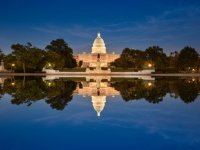Presidents’ Day: A Life Lesson for Students
Your content has been saved!
Go to My Saved Content.As Presidents' Day is upon us, every student at every grade level should participate in an academic lesson related to our nation's leaders. There are four questions I would like to see every student in every grade asked, with appropriate follow up:
- What would you do if you were President of the United States of America?
- Who would help you do this?
- How long do you think it would take to do this?
- What if you had a hard time, ran into some difficulties, some obstacles? What would you do then?
Each of these questions will be incredibly revealing to the teachers asking them, from kindergarten through high school. Underlying each one is a social-emotional, character, and life-learning lesson. Following a brief explication of these, I will present a sample "extra credit" assignment I strongly recommend teachers offer to student from the upper elementary through high school grades.
Each of the following life lessons should flow naturally from the conversation questions noted above. These should not be lectures, but drawing out the lesson from what the children say (or don't say).
- You might be President some day! Why not? It might even be a reason to care about your school work.
- No one is successful on their own. Everyone has helpers and needs help. Never hesitate to ask for help if you need it and be prepared to give help not only when you are asked but when you see people having difficulty (this makes a wonderful activity even for early childhood classes, but certainly for older students: how do you know when a classmate of yours might need some help?) And, even if you can't be President, you can still do some pretty important things.
- It takes time to get important things done. Not everything is instant. In fact, very little is. Important things take planning and we have to leave time for things to happen.
- Even though things seem easy when they are finished, there are almost always barriers, obstacles, roadblocks, and trouble along the way. That's just the way things are, and when that happens, we have to work to get around them. We have to be persistent about things we really care about, and we also have to be willing to do things differently from how we planned, and even compromise a little to get most of what we want. "Grit" means being tough and smart enough to persist even when things are not easy. But it means to persist in working toward one's goal, not persist in trying the same things over and over again that are not working.
How Presidents Overcame Tough Times
While we usually focus on Washington and Lincoln around Presidents' Day, some students may have an interest in other Presidents as well.
Here is the assignment:
Pick a President that you find interesting. It can be George Washington or Abraham Lincoln, but you also may want to pick Harry Truman, Lyndon Johnson, Woodrow Wilson, Ulysses Grant, Bill Clinton, John F. Kennedy, or Thomas Jefferson -- really, any one that you would like. Here are just a few examples of what they had to deal with:
Harry Truman had to decide whether or not to order a nuclear weapon to be dropped on Japan as a way of ending World War II.
Lyndon Johnson had to decide about giving more people, especially Blacks, voting rights, and he had to decide what to do about the was in Vietnam.
Woodrow Wilson wanted to bring about world peace by creating something he called the League of Nations. Ulysses Grant had to decide how to move the United States forward after the Civil War.
Bill Clinton came into office during a time when our economy was in terrible shape. John F. Kennedy learned that the Soviet Union had sent missiles to Cuba, less than 60 miles away from the United States border in Florida.
Thomas Jefferson wanted the United States to grow larger, stronger, and to have more freedom. Of course, all of these Presidents did other things as well.
Look up some things that the President you chose did that were important. Pick one or two of these things that you find most interesting and write about the obstacles they faced in trying to get them done. Who was against them? Why? What did they do? And then, write about how the President responded. What did the President do? Who helped? Was it successful? What lesson about life did you learn from looking into this?
Adjust Accordingly
Depending on how this might fit into your academic curriculum, you can decide how the assignment should be written up, depicted, charted, or otherwise presented. Then, arrange for some kind of display of what students did. This can take the form of an exposition, perhaps inviting parents and the community, a magazine (digital or print), or a gallery walk within the school, or a series of bulletin boards, or taking digital pictures and creating a digital archive that is shared with the school community and beyond.
This recognition is what the "extra credit" is all about -- bringing credit to the school for having such inquisitive students, bringing knowledge to classmates and community, and bringing life lessons to oneself.
Share with us your lessons for Presidents' Day in the comments section below.
